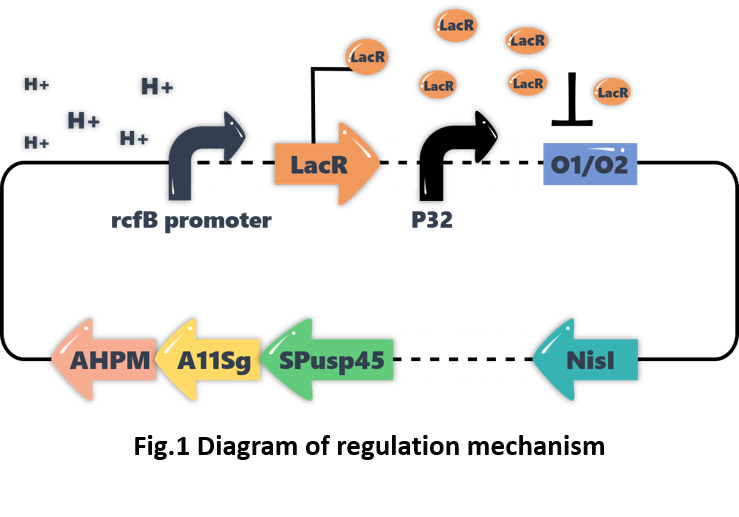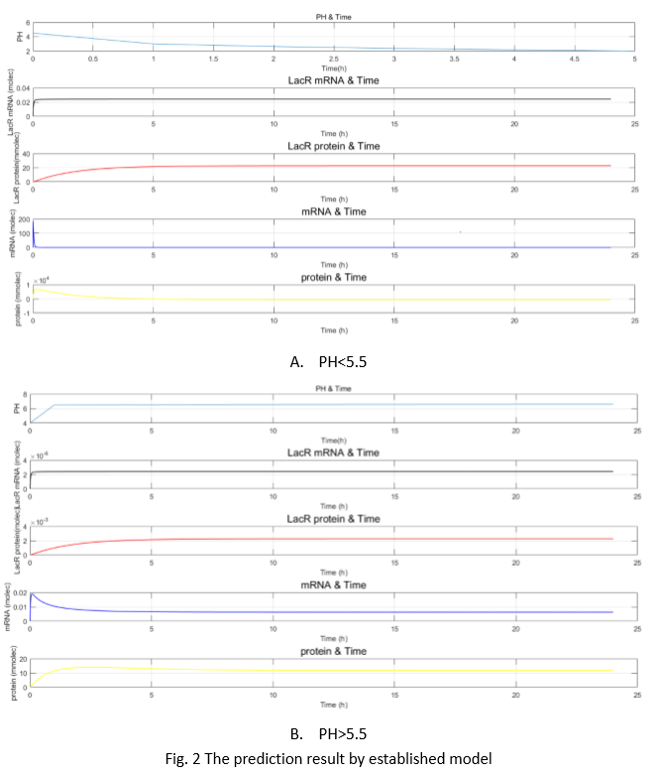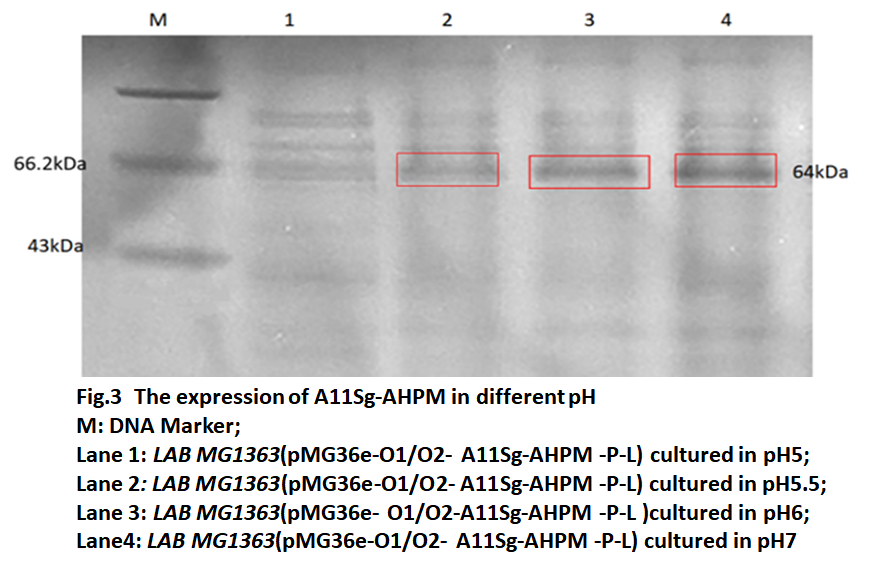Part:BBa_K3142002
Acid-induced promoter and repressor lacR of lac operon
The rcfB promoter, a member of the CRP-FNR positive regulation family, was amplified from chromosomal DNA lactis subsp. lactis IL1403. It is an important part of the P170 promoter regulated by acid. Lac repressor (LacR) and operator sequences (O1 and O2) is part of the lactose operon derived from Lactobacillus delbrueckii. O1 and O2 may serve as operators for the binding of the lac repressor (LacR) to prevent repressing the expression of downstream genes.When the external pH value declines to 5.5, rcfB promoter will be highly upregulated. Along with that, the LacR gene, which is downstream of rcfB will be highly transcribed. The large translation of LacR, the repressor of lac operon in Lactobacillus delbrueckii, will inhibit the use of lactose in the bacteria.
Sequence and Features
- 10INCOMPATIBLE WITH RFC[10]Illegal prefix found in sequence at 9
- 12INCOMPATIBLE WITH RFC[12]Illegal EcoRI site found at 9
Illegal NotI site found at 15 - 21INCOMPATIBLE WITH RFC[21]Illegal EcoRI site found at 9
- 23INCOMPATIBLE WITH RFC[23]Illegal prefix found in sequence at 9
- 25INCOMPATIBLE WITH RFC[25]Illegal prefix found in sequence at 9
Illegal XbaI site found at 24
Illegal NgoMIV site found at 149
Illegal NgoMIV site found at 1052 - 1000INCOMPATIBLE WITH RFC[1000]Illegal BsaI.rc site found at 989
Illegal SapI.rc site found at 718
SZPT-China
Verification by A11Sg-AHPMprotein expression
First, we constructed a vector that regulates the expression of a protein of interest through the PrcfB promoter. The vector has the characteristic that when the pH is less than 5.5, the PrcfB promoter strongly expresses the LacR, and the LacR binds to the O1/O2 site to repress the production of the target protein. When the pH is greater than 5.5, the PrcfB promoter is weakly expressed, and the protein of interest can be expressed without being repressed. Fig 1 shows the regulation mechanism.
Model
In order to know if PrcfB promotor can work Lactococcus lactis MG1363, We established a model of pH-induced promoter regulation on the target protein of Lactococcus lactis MG1363. Then, we performed numerical simulations on the model and sensitivity analysis on some key parameters. The results of this model are shown in Fig.2
According to the model, when the pH was less than 5.5, the expression protein of the Lactococcus lactis MG1363 was inhibited after 4 hours. It means that during the fermentation of lactic acid bacteria, when the pH of the external environment drops below 5.5, the expression of the target protein will be inhibited after 4 hours. It is beneficial to reduce the energy consumption of the bacteria, and is beneficial to increase the expression of our target protein in the intestinal tract. When the pH of the external environment rises above 5.5, the expression of the target protein can be observed after about 2 hours, and the expression rate is relatively stable. It indicates that the corresponding protein of interest will be expressed by lactic acid bacteria two hours after it is colonized into the intestine.
The regulation of PrcfB in A11sg-AHPM protein
From our model, we predicted that the vector containing the PrcfB promoter could express our target protein at pH above 5.5, and could not express our target protein at pH less than 5.5. According to our established model, we inoculated Lactococcus lactis containing the vector into GM17 medium at pH 5, pH 5.5, PH 6, and pH 7 for 30 hours, then collected the cells and verified by SDS-PAGE. Fig.3 is the expression result.
The results showed when the pH is less than 5.5, PrcfB initiate the expression of LacR, the which bind to O1/O2, then depressed the expression of A11Sg-AHPM. When pH≥5.5, the PrcfB is turned off and the expression of LacR decrease, the expression of A11Sg-AHPM is initiated and the expression level increases along with the increase of pH. All the experimental results above show that the codons are successfully optimized, the length of the sequence is reduced, and the function of the components is improved. This will facilitate the team that will use this component to regulate at low pH in the future.
Reference:
- Madsen S M, Arnau J, Vrang A, et al. Molecular characterization of the pH-inducible and growth phase-dependent promoter P170 of Lactococcus lactis. Molecular Microbiology, 1999, 32(1):75-87.
- Søren M. Madsen, Thomas Hindré, Jean-Paul Le Pennec, et al. Two acid-inducible promoters from Lactococcus lactis require the cis-acting ACiD-box and the transcription regulator RcfB. Molecular Microbiology, 2005, 56(3):735-746.
- Ismail AKYOL, Ugur COMLEKCIOGLU, Asuman KARAKAS, Kalbiye SERDAROGLU, Mehmet Sait EKINCI, Emin OZKOSE. Regulation of the acid inducible rcfB promoter in Lactococcus lactis subsp. Lactis. Annals of Microbiology, 2008, 58 (2) 269-273.
| None |



